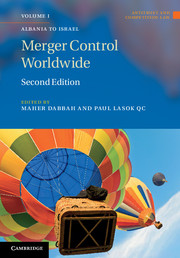Book contents
- Frontmatter
- Contents
- Preface
- List of Contributors
- Table of cases
- Table of Legislation and Official Guidance
- Introduction
- Albania
- Argentina
- Armenia (Republic of Armenia)
- Australia
- Austria
- Barbados
- Belgium
- Bosnia and Herzegovina
- Brazil
- Bulgaria (Republic of Bulgaria)
- Canada
- Chile
- China*
- Costa Rica
- Croatia
- Cyprus (Republic of Cyprus)
- Czech Republic
- Denmark
- Estonia
- European Economic Area
- European Union
- Finland
- France
- Germany (Federal Republic of Germany)
- Greece
- Hong Kong
- Hungary
- Iceland
- India
- Indonesia (Republic of Indonesia)
- Ireland
- Israel
- Italy
- Japan
- Kenya
- Korea
- Latvia
- Lithuania
- Macedonia (Republic of Macedonia)
- Malta
- Mexico
- Netherlands (The Netherlands)
- New Zealand
- Norway
- Pakistan
- Peru
- Philippines (Republic of the Philippines)
- Poland
- Portugal
- Romania
- Russia
- Serbia
- Singapore
- Slovakia (Slovak Republic)
- Slovenia
- South Africa
- Spain
- Sri Lanka
- Sweden
- Switzerland
- Taiwan
- Thailand
- Tunisia (Republic of Tunisia)
- Turkey
- Ukraine
- United Kingdom
- United States of America
- Uzbekistan
- Venezuela
- Zambia
- Index
Switzerland
Published online by Cambridge University Press: 05 November 2014
- Frontmatter
- Contents
- Preface
- List of Contributors
- Table of cases
- Table of Legislation and Official Guidance
- Introduction
- Albania
- Argentina
- Armenia (Republic of Armenia)
- Australia
- Austria
- Barbados
- Belgium
- Bosnia and Herzegovina
- Brazil
- Bulgaria (Republic of Bulgaria)
- Canada
- Chile
- China*
- Costa Rica
- Croatia
- Cyprus (Republic of Cyprus)
- Czech Republic
- Denmark
- Estonia
- European Economic Area
- European Union
- Finland
- France
- Germany (Federal Republic of Germany)
- Greece
- Hong Kong
- Hungary
- Iceland
- India
- Indonesia (Republic of Indonesia)
- Ireland
- Israel
- Italy
- Japan
- Kenya
- Korea
- Latvia
- Lithuania
- Macedonia (Republic of Macedonia)
- Malta
- Mexico
- Netherlands (The Netherlands)
- New Zealand
- Norway
- Pakistan
- Peru
- Philippines (Republic of the Philippines)
- Poland
- Portugal
- Romania
- Russia
- Serbia
- Singapore
- Slovakia (Slovak Republic)
- Slovenia
- South Africa
- Spain
- Sri Lanka
- Sweden
- Switzerland
- Taiwan
- Thailand
- Tunisia (Republic of Tunisia)
- Turkey
- Ukraine
- United Kingdom
- United States of America
- Uzbekistan
- Venezuela
- Zambia
- Index
Summary
The Competition Act 1995
Merger control was first introduced in Switzerland in the Federal Act on Cartels and other Restraints of Competition of 6 October 1995 (‘the Competition Act 1995’, or ‘Acart’), which entered into force on 1 July 1996. The basic principles of Swiss merger control are contained in Articles 9 to 11 (substantive assessment) and in Articles 32 to 38 (procedure) of the Competition Act 1995.
The Competition Act 1995 was partly amended on 20 June 2003, with effect from 1 April 2004. The main purpose of this amendment was to confer upon the Swiss competition authorities the power to issue direct sanctions – that is, administrative fines – in the case of enterprises being found to have entered into a hardcore cartel or to have committed an abuse of a dominant position. As far as merger control is concerned, this amendment did not contain any changes, except concerning the special turnover thresholds in the banking and media sectors.
The Merger Control Ordinance
The Swiss Federal Council adopted an Ordinance on the Control of Merger of Enterprises (‘the Merger Control Ordinance’, or ‘MCO’) on 17 June 1996. The Merger Control Ordinance entered into force on 1 July 1996. The Merger Control Ordinance has also been partly amended, with effect from 1 April 2004, in relation to the special turnover thresholds in the banking and media sectors.
- Type
- Chapter
- Information
- Merger Control Worldwide , pp. 1358 - 1394Publisher: Cambridge University PressPrint publication year: 2012



